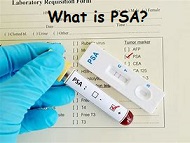What Is PSA and Its Connection with Prostatitis?
Date:2019-09-26 click:0
Prostate-specific antigen (PSA) is synthesized and secreted from prostate epithelial cells to semen, which is one of the main components of seminal plasma. In the late 1960s, Hare et al. found that there was a semen-specific protein with a molecular weight of about 34,000 in prostatic fluid and semen during the study of immunocontraception. The protein was extracted and purified from prostate tissue in 1979. Because this protein only exists in prostate tissue, it is named prostate-specific antigen.

The prostate antigen is a protein produced by the prostate. The increase of prostate-specific antigen in the blood may be a sign of cancer, but it may also be caused by aging, hypertrophy, or prostatitis. According to the report, the main problems of the PSA test are false-positive results and overdiagnosis. Once the diagnosis is confirmed to be positive, patients will usually undergo more examinations such as biopsy, which will lead to other risks such as bleeding, infection, and urinary incontinence.
Acute prostatitis is relatively rare, and its incidence is about 5% of all prostatitis. In 1989, Dalton reported for the first time the elevation of serum PSA in patients with acute prostatitis. PSA returned to normal after adequate dosage of antibiotics.
The effect of chronic prostatitis on PSA is less definite than that of acute prostatitis. Only 15% of patients with chronic prostatitis had serum PSA > 4ng/ml. The level of serum PSA may be positively correlated with the severity of chronic prostatitis. The increase of PSA caused by prostatitis is caused by the impairment of the integrity of the membrane anatomy and physiological barrier of the prostate, which increases the leakage between prostatic gland tissue and blood flow.

Multivariate regression analysis showed that prostatitis contributed 7% to the change of serum PSA. The total PSA and f/tPSA of patients with prostatic hyperplasia and prostatitis decreased significantly. Patients with prostatitis confirmed by elevated serum PSA and no abnormality on digital rectal examination decreased serum PSA after appropriate antibiotic treatment, and patients with simple inflammation were more pronounced than those with malignant tendency.
Anti-inflammatory therapy for BPH patients with serum PSA > 4.0ng/ml and chronic prostatitis can not only improve the specificity of PSA in the diagnosis of early prostate cancer but also help some patients avoid the pain and complications caused by prostate biopsy puncture. Patients can also be effectively treated by Diuretic and Anti-inflammatory Pill, which is made up of a variety of natural herbs, so it will not have any side effects on the human body. It can effectively resist bacteria and eliminate inflammation, promote blood circulation and remove blood stasis, and fundamentally cure prostatitis and relieve the symptoms of patients.
In patients with prostatitis whose PSA is elevated, but without clinical symptoms, the degree of inflammation is related to the level of PSA, but it is significant only for patients with small prostate volume because the prostate volume is also an essential factor affecting serum PSA when the prostate volume is large. The increase of PSA is not related to the extent of prostatic inflammation, but the degree of destruction of the prostatic epithelium.

Evidence shows that almost one-fifth of men aged 55 to 69 had at least one false positive report of prostate-specific antigen, and about 17% had undergone unnecessary biopsy. The Task Force recommends that men under 55 and over 70 do not use prostate-specific antigen for cancer screening. Men aged 55 to 69 who are at high risk for prostate cancer are not recommended for PSA screening or should be cautious after discussing the pros and cons in detail with their doctors.



